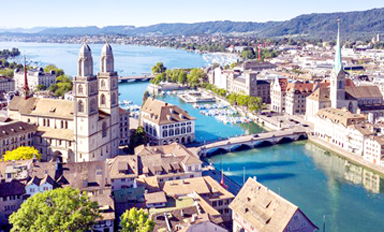DE Lifestyle Desk
It has been quietly making its case for being one of the best places in the world to live, with multiple cities listed in 2024’s Global Liveability Index and Smart City Index.
When it comes to the world’s best country rankings, Scandinavia typically tops the charts. We’re used to seeing Denmark, Finland and Norway leading the pack in the world’s happiest country lists – but another European country has been quietly making its case for being one of the best places in the world to live.
With multiple cities listed in the top 10 of this year’s Global Liveability Index and the Smart City Index, Switzerland shows that its policies offer nationwide impact.
Zurich and Geneva cracked the top 10 most liveable cities, with perfect scores in healthcare and education; while Zurich came in as the number one smart city for its chart-topping infrastructure and technology score, with Geneva following close behind in fourth place, followed by Lausanne in seventh.
- Advertisement -
As a smaller country bordered by five other nations, Switzerland has been influenced by various cultures and languages throughout its existence, which has led to positive styles of governance, according to residents.
“One big cultural influence is our history as a ‘nation by will’, with a lot of minorities (cultural, ethnic, language etc), resulting in a high sensitivity and acceptance of compromises,” said resident Res Marty, founder of Switzerland Beyond Chocolate.
The country famously practices direct democracy where every citizen gets a vote on laws and referendums, which helps residents feel like they have a real voice when it comes to how they live and how their tax dollars are spent.
“In our village, they wanted to extend the school so there was a vote to raise the tax for five years to pay for it,” said Rosamund Tagel, founder of Glow Concierge, who lives and works in Zürich. “The vote passed with an overwhelming majority because people understand the importance of education.”
We spoke to residents about how these policies shape Switzerland as a premier place to live, and how they contribute to an overall higher quality and enjoyment of life.
- Advertisement -
Education with impact
In the Global Liveability ranking, both Geneva and Zurich scored a perfect 100 on education – something that residents noted as particular point of pride. “Public schools are excellent. If I still lived in the UK, I would 100% send my children to private school.
But in Switzerland it’s just not needed,” said Tagel. “It’s so international at our local school that my kids speak four languages and that is fairly typical. Every single one of their friends speaks at least two, and most three or four, which is such a massive advantage.”
The classes here aren’t just focussed on academic achievement either. Skills for life and work are also taught and graded.
- Advertisement -
“The curriculum includes social competencies, independence, self-organisation and respectful conduct,” said Barbara Rose Collins, originally from Sydney, Australia, who lives in Küsnacht, a small lakeside town at the edge of Zurich.
“All of these are separately assessed on school reports and carry equal weighting to academic results during progression decisions.”
Safety and social life
A strong sense of security and safety across Switzerland means kids walk to and from school as early as age four – perhaps no surprise as the Swiss cities ranked highly in the stability, culture and environment parts of the indexes.
Tagel notes that she loves the fact that her kids can run off to play with their friends, knowing they will return safely and “magically appear” by sundown.
“Of course there is crime like in any country, but the stats in Switzerland are one of the lowest in the world,” she said. “People still leave their doors unlocked outside of the cities when popping out.”
And popping out they do. Social and family life are prioritised here, which can lead to a slower pace of life. “When you enter Switzerland, you turn your watch back about 60 years and hit the slo-mo button on your remote,” said Collins.
“Nobody is in a rush – rushing is considered something done by people who are disorganised. Everyone goes for their daily walks, fixed working hours are practically a religion, no long commutes, few traffic jams, and people take time to sit down to eat and drink with scarce takeaway options.”
This also comes across as a healthy respect for farming and the food supply, with traffic often coming to a halt to let animals walk down the street or allow a tractor to pass.
Main streets might be closed during the morning commute for workers to plant seasonal flowers and update roadside landscaping, but that job is viewed just as important as anyone else’s role, according to Collins.
A nod to nature
Switzerland also lucks out thanks to its naturally beautiful landscape that’s painted with rivers, lakes and the imposing Alps (covering 60% of the country’s whole surface area).
With high scores in culture and environment in the liveability index, Swiss cities’ proximity to nature contributes highly to residents’ sense of happiness, especially since governmental and cultural norms allow ample time and space to enjoy it.









